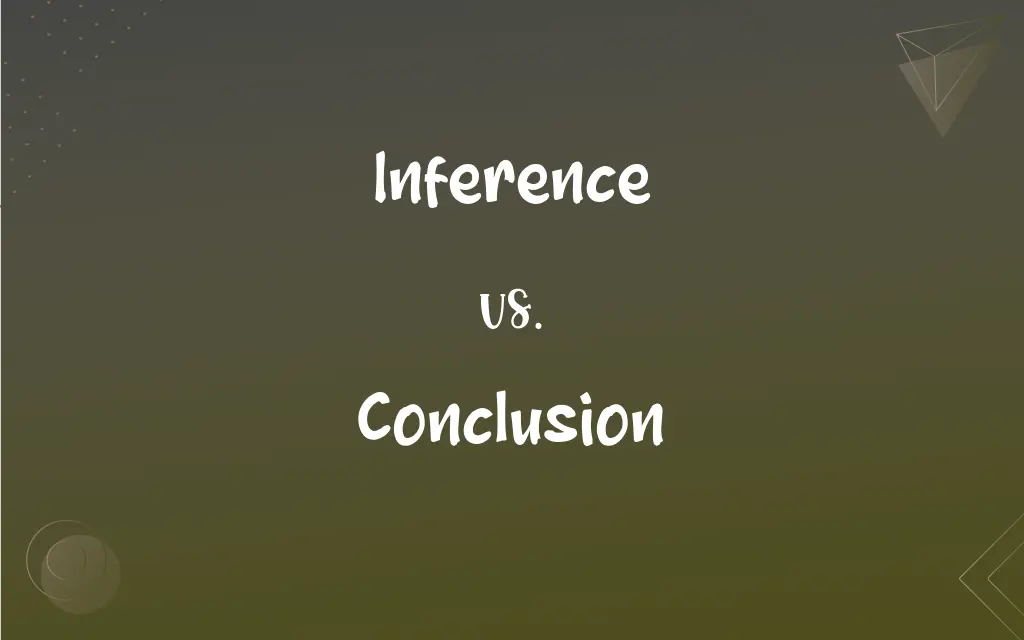Inference vs. Conclusion: What's the Difference?
By Janet White || Published on December 1, 2023
Inference is a reasoning process to arrive at a logical assumption, while a conclusion is the final judgment or decision reached at the end of an argument or process.

Key Differences
Inference involves drawing logical assumptions based on available evidence or known facts. A conclusion, however, is the final decision or opinion formed after considering all the information and inferences.
Inferences are often the steps leading to a conclusion, representing the reasoning process. On the other hand, conclusions are the endpoint of reasoning, representing the final judgment.
An inference may not always be explicitly stated, but is deduced from the information. Whereas, conclusion is usually explicitly stated as the final outcome of an argument or analysis.
Inferences can lead to multiple possible interpretations or conclusions. Meanwhile, a conclusion is typically a singular decision or opinion, formed after considering various inferences.
Inferences are part of critical thinking and analysis, often tentative and revisable. Although, conclusions represent a closure or resolution, often definitive and less subject to change.
ADVERTISEMENT
Comparison Chart
Definition
Logical assumption based on evidence.
Final judgment or decision in a reasoning process.
Role in Reasoning
A step in the process of drawing conclusions.
The end point or outcome of the reasoning process.
Explicitness
Often implicit and deduced.
Usually explicitly stated or declared.
Variability
Can lead to multiple possibilities.
Typically a singular, definitive outcome.
Nature
Part of ongoing analysis, often revisable.
Represents closure, usually less subject to revision.
ADVERTISEMENT
Inference and Conclusion Definitions
Inference
Inference is deducing information from known facts.
From the footprints, she made an inference about the animal's size.
Conclusion
Conclusion is a judgment or decision formed after investigation.
His conclusion was that the experiment proved the hypothesis.
Inference
Inference involves logical reasoning from observations.
The detective’s inference was based on the evidence at the crime scene.
Conclusion
Conclusion is the end or finish of an event or process.
The project came to its conclusion on a successful note.
Inference
Inference is forming an opinion from indirect evidence.
His inference about the weather came from the cloudy skies.
Conclusion
Conclusion is the decision reached after consideration.
The jury reached a conclusion after hours of deliberation.
Inference
Inference is the act of drawing a conclusion based on evidence.
His inference was that the business would succeed based on market trends.
Conclusion
Conclusion is the summing up of an argument or text.
The essay's conclusion effectively summarized its key arguments.
Inference
Inference is the process of arriving at a logical assumption.
Her inference about the novel's theme was based on its symbolism.
Conclusion
A conclusion is the final part of something, summing up the main points.
The conclusion of her speech left the audience inspired.
Inference
The act or process of deriving logical conclusions from premises known or assumed to be true.
Conclusion
The close or last part; the end or finish
The conclusion of the festivities.
Inference
The act of reasoning from factual knowledge or evidence.
Inference
Something inferred.
Inference
Usage Problem A hint or suggestion
The editorial contained an inference of foul play in the awarding of the contract. See Usage Note at infer.
Inference
(uncountable) The act or process of inferring by deduction or induction.
Inference
(countable) That which is inferred; a truth or proposition drawn from another which is admitted or supposed to be true; a conclusion; a deduction.
Inference
The act or process of inferring by deduction or induction.
Though it may chance to be right in the conclusions, it is yet unjust and mistaken in the method of inference.
Inference
That which inferred; a truth or proposition drawn from another which is admitted or supposed to be true; a conclusion; a deduction.
These inferences, or conclusions, are the effects of reasoning, and the three propositions, taken all together, are called syllogism, or argument.
Inference
The reasoning involved in drawing a conclusion or making a logical judgment on the basis of circumstantial evidence and prior conclusions rather than on the basis of direct observation
FAQs
How does inference relate to evidence?
Inference is drawing a logical assumption from given evidence.
What is a conclusion?
A final judgment or decision reached at the end of reasoning.
Is a conclusion always definitive?
Generally, but it can be revised with new information.
Can a conclusion be the start of further analysis?
Sometimes, especially if new information emerges.
Can an inference be wrong?
Yes, if based on incorrect or insufficient evidence.
Can conclusions be based on multiple inferences?
Yes, conclusions often consider multiple inferences.
Are inferences always explicit?
No, they can be implicit and require interpretation.
What is an inference?
A logical assumption or deduction based on evidence.
Is inference a part of the scientific method?
Yes, it's essential in forming hypotheses and interpretations.
Do inferences require critical thinking?
Yes, they involve analyzing and reasoning from evidence.
Can a conclusion be an opinion?
Yes, especially in arguments or analysis of subjective topics.
Can a conclusion be universal?
Rarely, as it often depends on specific circumstances or data.
How do inferences differ in science and literature?
In science, they're based on empirical data; in literature, on thematic analysis.
Are inferences based on observations?
Yes, observations are a key source for making inferences.
Can a conclusion change over time?
Yes, especially with new evidence or insights.
Is reaching a conclusion a final step?
Typically, but it can be a precursor to further inquiry.
Are conclusions subjective?
They can be, depending on the interpretation of evidence.
Do inferences always lead to conclusions?
Often, but not always – some inferences may remain open.
How important are inferences in research?
Crucial, as they guide interpretation of data and results.
Can inferences be used to predict outcomes?
Yes, especially in fields like statistics or forecasting.
About Author
Written by
Janet WhiteJanet White has been an esteemed writer and blogger for Difference Wiki. Holding a Master's degree in Science and Medical Journalism from the prestigious Boston University, she has consistently demonstrated her expertise and passion for her field. When she's not immersed in her work, Janet relishes her time exercising, delving into a good book, and cherishing moments with friends and family.








































































